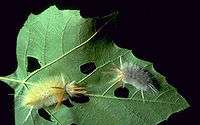Halysidota harrisii
| Halysidota harrisii | |
|---|---|
 | |
| Scientific classification | |
| Kingdom: | Animalia |
| Clade: | Euarthropoda |
| Class: | Insecta |
| Order: | Lepidoptera |
| Superfamily: | Noctuoidea |
| Family: | Erebidae |
| Genus: | Halysidota |
| Species: | H. harrisii |
| Binomial name | |
| Halysidota harrisii Walsh, 1864 | |
Halysidota harrisii (sycamore tussock moth) is a species of moth of the family Erebidae. It is found in South-Eastern Canada, the Eastern parts of the United States (but not Florida) and North-Eastern Mexico. The wingspan is about 50 mm. The moth flies from May to June and from July to August depending on the location.
The larvae feed on the American sycamore tree (Platanus occidentalis). An overpopulation of the insect can be damaging to sycamore trees. The ideal way to manage the moth and caterpillar populations is to foster a healthy bird population.
The sycamore tussock moth caterpillar has been known to cause urticaria (hives) to those who touch its hairs. This defense mechanism protects the caterpillar from potential predators.

Caterpillars and leaf damage
.jpg)
Caterpillar
External links
- Species info
- Bug Guide
- Smith-Norowitz, TA; Norowitz, KB; Kohlhoff, S; Kalra, K; Chice, S; Bluth, MH (2010). "Immune response profiles after caterpillar exposure: a case report". J Inflamm Res. 3: 45–51. PMC 3218733. PMID 22096356.
This article is issued from
Wikipedia.
The text is licensed under Creative Commons - Attribution - Sharealike.
Additional terms may apply for the media files.